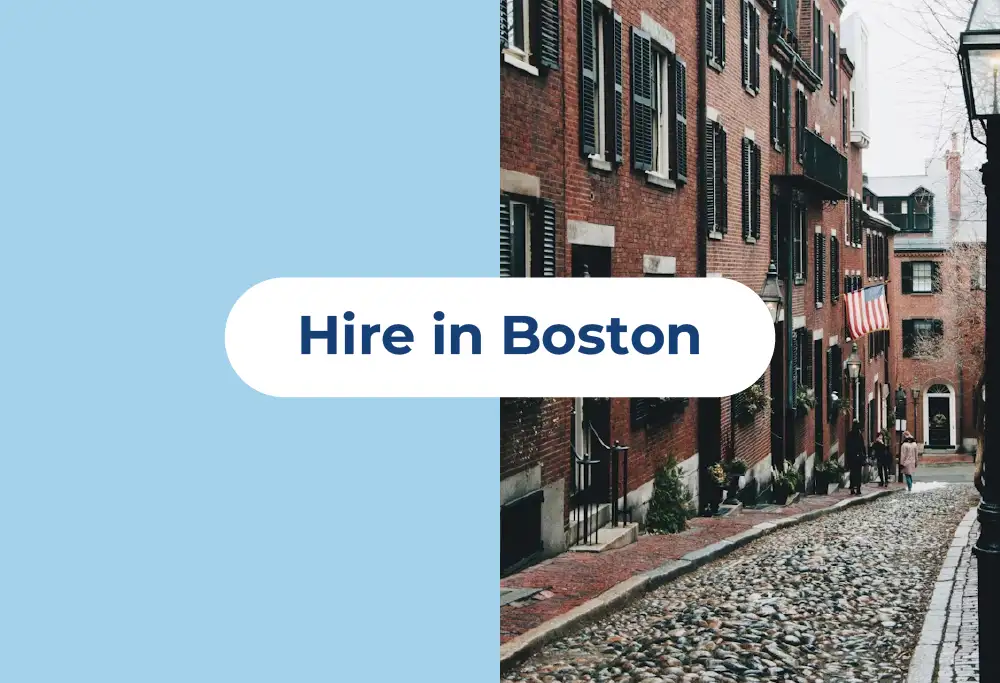Boston, the capital of Massachusetts and one of the oldest cities in the United States, has grown into a global leader in education, healthcare, biotechnology, and finance. Known as the “Athens of America” for its academic excellence, Boston offers a deep talent pool supported by world-class universities such as Harvard University and the Massachusetts Institute of Technology (MIT).
For companies expanding into the U.S. in 2025, Boston represents one of the most strategic locations. The city combines academic prestige, a thriving innovation ecosystem, and a diversified economy. At the same time, employers must navigate Massachusetts’s progressive labor laws and the competitive job market shaped by the city’s global appeal.
This guide explores everything employers must know about hiring in Boston in 2025, from compliance and taxation to recruitment strategies and employee benefits.
How to Hire in Boston Easily in 2025
Employers can hire in Boston using two main approaches:
- Establishing a U.S. entity in Massachusetts, registering with state and federal authorities, and taking full responsibility for HR, payroll, and compliance.
- Partnering with an Employer of Record (EOR), which allows companies to hire talent in Boston without creating a local entity. The EOR manages payroll, benefits, contracts, and compliance, while the employer directs the employee’s work.
The hiring process in Boston typically includes:
- Drafting job descriptions aligned with local industry standards.
- Complying with U.S. federal labor laws and Massachusetts-specific regulations.
- Registering for employer taxes and payroll with state authorities.
- Providing competitive benefits packages to attract talent in healthcare, education, technology, and finance.
- Leveraging Boston’s extensive recruitment ecosystem, including universities, job boards, and industry associations.
Why Hire in Boston? The Benefits of Hiring in Boston
Strategic Location
Boston is a leading business hub on the U.S. East Coast, with close proximity to New York City, Washington, D.C., and European markets. Logan International Airport provides direct flights to major global destinations, making the city an ideal location for international companies. Boston’s role as a center for global trade and finance also enhances its strategic appeal.
Highly Educated Workforce
Boston’s greatest strength lies in its universities and research institutions. Harvard, MIT, Boston University, and Northeastern University consistently rank among the top in the world, producing graduates in engineering, medicine, law, business, and the sciences. The city also benefits from research-driven innovation, with its universities fueling the biotech and healthcare industries.
Innovative Ecosystem
Boston is at the forefront of industries such as biotechnology, pharmaceuticals, medical devices, clean energy, and financial services. The city’s startup ecosystem is supported by venture capital investment, academic partnerships, and government initiatives aimed at fostering innovation.
Quality of Life and Talent Attraction
Boston consistently ranks as one of the best cities in the U.S. for quality of life. Its cultural heritage, world-class healthcare, and thriving arts scene make it attractive for skilled professionals. While the cost of living is high, the city’s strong professional opportunities continue to draw talent from around the world.
Legal Requirements for Hiring Employees in Boston
Employers must comply with both federal labor laws and Massachusetts state regulations, which are among the most employee-friendly in the U.S.
Employment Contracts
Massachusetts follows the “at-will” employment model, allowing either party to terminate the employment relationship at any time, provided it does not violate discrimination or labor laws. Written employment contracts are not mandatory but are recommended for outlining compensation, benefits, and job responsibilities.
Working Hours and Overtime
The standard workweek in Boston is 40 hours. Under the Fair Labor Standards Act (FLSA) and Massachusetts law, non-exempt employees must be paid 1.5 times their hourly rate for hours worked beyond 40 in a week. Massachusetts also requires additional protections around meal breaks and rest periods.
Probation Periods
Probationary periods are not legally mandated in Massachusetts but are commonly used. Many Boston employers implement a 90-day introductory period to evaluate new hires.
Termination of Employment
Massachusetts is an at-will state, but employers must comply with strict anti-discrimination and wrongful termination protections. Employers are encouraged to document all employment decisions carefully to reduce legal risks. Severance pay is not legally required, though it is often provided voluntarily in competitive industries.
Taxation and Social Security Contributions in Boston
Employers hiring in Boston must comply with both federal tax obligations and Massachusetts-specific payroll requirements.
1. Individual Income Tax (IIT)
Massachusetts imposes a flat state income tax rate of 5% on wages, in addition to federal income tax, which ranges from 10% to 37%. Employers must withhold both federal and state taxes from employee wages.
2. Employer Contributions to Social Insurance
Employers in Boston contribute to several mandatory programs:
- Social Security: 6.2% of wages (matched by employees).
- Medicare: 1.45% of wages (matched by employees).
- Federal Unemployment Tax (FUTA): 0.6% on the first $7,000 in wages after credits.
- Massachusetts State Unemployment Insurance (SUI): Rates vary depending on employer experience and industry.
- Paid Family and Medical Leave (PFML): Massachusetts requires joint contributions from employers and employees to fund family and medical leave benefits.
3. Contribution Bases
Social Security contributions are capped at a federal wage base (projected at $168,600 in 2025). Medicare has no wage cap, though employees earning over $200,000 must pay an additional 0.9% surtax.
Work Permits and Other Requirements for Hiring Foreign Workers in Boston
Boston’s international reputation attracts many foreign professionals. Employers hiring non-U.S. citizens must comply with immigration requirements.
- Visa Sponsorship: Employers frequently sponsor H-1B visas (specialty occupations), L-1 visas (intra-company transfers), and O-1 visas (extraordinary ability). Employers must prove the role cannot be filled locally.
- Labor Condition Application (LCA): Required for certain visa types, ensuring fair wages and compliance with labor protections.
- E-Verify: Some Massachusetts employers use E-Verify to confirm employee eligibility.
- Medical and Background Checks: Many visa applications require background verification and health screenings.
Current Trends and Top Recruitment Strategies in Boston
Boston’s competitive labor market requires strategic approaches to recruitment.
- University Engagement: Employers partner with Harvard, MIT, Northeastern, and Boston University to access talent pipelines in STEM, healthcare, and business.
- Focus on Biotech and Healthcare: As a global leader in life sciences, Boston attracts top professionals in biotechnology, pharmaceuticals, and medical research. Employers should emphasize innovation and long-term growth opportunities.
- Diversity and Inclusion: Boston has a highly diverse workforce, and inclusive hiring practices are critical for attracting and retaining employees.
- Flexible Work Models: Hybrid and remote work arrangements remain popular, especially in the technology and finance sectors.
- Networking and Industry Events: Boston hosts numerous conferences and professional events, providing valuable opportunities to connect with talent.
Hiring Skilled Workers vs. Entry-Level Talent in Boston
Hiring Skilled Workers
Skilled professionals in Boston, particularly in healthcare, finance, and technology, expect comprehensive benefits, career advancement opportunities, and competitive work environments. Employers should highlight innovation, professional development, and leadership roles.
Hiring Entry-Level Talent
Boston’s universities supply a continuous flow of entry-level candidates. To attract young professionals, companies should provide mentorship, internships, structured training, and tuition reimbursement. These initiatives not only attract talent but also improve long-term retention.
Competitive Benefits in Boston
Benefits play a central role in attracting and retaining employees in Boston. Common offerings include:
- Health, dental, and vision insurance
- 401(k) retirement plans with employer contributions
- Paid vacation, sick leave, and parental leave
- Tuition reimbursement and education benefits
- Professional development and training programs
- Wellness initiatives, including gym memberships and mental health support
- Hybrid or remote work flexibility
Hiring Solutions for Foreign Companies in Boston
Foreign companies hiring in Boston can choose from three main models:
Independent Contractors: Flexible and cost-effective but must be classified properly to avoid misclassification issues under IRS and Massachusetts laws.
Establishing a U.S. Entity: Provides direct control but requires incorporation, tax registration, and compliance with Massachusetts’s employment laws.
Employer of Record (EOR): The most efficient solution for foreign companies. An EOR manages payroll, contracts, and compliance, allowing the employer to focus on managing the employee’s performance and integration.
Trust INS Global to Hire in Boston Today
Boston offers one of the most skilled and innovative labor markets in the world in 2025. With its strategic location, global reputation for education and healthcare, and thriving startup ecosystem, the city is an ideal destination for companies across industries.
At the same time, employers must navigate Massachusetts’s progressive labor laws, state taxes, and complex compliance requirements. That’s where INS Global can help.
Our Employer of Record (EOR) services in Boston simplify hiring, ensuring full compliance with all federal and state regulations while allowing you to scale quickly.



SHARE